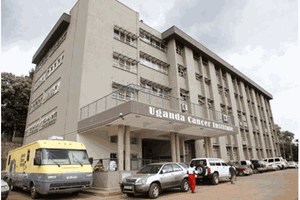
74-year-old Josephine Bamuwamye is a retired midwife and breast cancer survivor. PHOTO/BEATRICE NAKIBUUKA
Ms Josephine Bamuwamye’s journey as a breast cancer survivor spans a remarkable 24 years, a testament to her strength and resilience.
At 74, this retired midwife carries with her the weight of a story that began in the heart of Kenya, where a seemingly innocent moment in the bathroom forever changed her life. While bathing, she discovered a lump in her left breast, a silent alarm bell ringing in the quiet of her daily routine.
With trepidation, she confided in a colleague, who hesitated to acknowledge the gravity of the situation.
“I think my friend was afraid of telling me the truth. I told her to examine me but she said she did not feel anything,”Ms Bamuwamye recalls, her voice heavy with the memories of that day. Driven by an instinct to confront her fears, she sought help at a nearby clinic, where the reality of her situation began to sink in: she needed to go to a larger hospital for proper care, so said the health worker at the clinic.
As she navigated the frightening maze of uncertainty, her mind raced. Her husband had passed away when their children were still young, leaving a void that haunted her. “Who would care for them if I were gone?” she thought, the fear of leaving her children alone consuming her.
Returning home, she confided in her friend, only to learn that she, too, had discovered a lump but had been paralysed by the same fears that gripped Ms Bamuwamye.
In a poignant act of solidarity, they set out together to Kenyatta National Referral Hospital, where they learned about the importance of early diagnosis and treatment.
After the sensitisation of all the women that had showed up for the screening on that day, individual turns came for the biopsy whose results they could not get immediately.
The waiting was agonising. A month stretched endlessly as she grappled with a torrent of fears and unsolicited advice. Friends, well-meaning yet misinformed, cautioned her against surgery to remove her breast, sharing tales of loved ones lost after undergoing mastectomies.
“Breasts define a woman’s body,” they warned, as if she could lose not just a physical part of herself, but her very identity. Others urged her to try costly health products that promised miracles, while some simply offered prayers, claiming the lump would vanish but all these did not come through for her. The lump remained, a stubborn reminder of her fragility.
When the moment of picking the results finally arrived, Ms Bamuwamye felt her heart sink. Her friend emerged from the examination room, holding a piece of paper declaring her free of cancer. But when Josephine’s turn came, her results were carefully tacked in an envelope and the doctor’s words pierced through her like a dagger: “You have cancer. You need to write a will and let your children know what is there for them. You have five years to live.” Overwhelmed with despair, she cried, explaining her prognosis to her children, whose faces reflected a haunting helplessness.
In that moment of darkness, however, her spirit flickered with determination. She decided to undergo the surgery, accepting the loss of her breast as a necessary step toward survival. Following the procedure, she faced the gruelling reality of chemotherapy.
“It was a harsh battle,” she reflects. “I lost my hair, my nails turned black, and I was constantly sick.” Yet, through her pain, she became a pillar of strength for her children, who looked to her for hope even as they wept for their mother’s suffering. “I had to keep going,” she says, “not just for me, but for them.”
On the days she felt better after receiving the chemotherapy, Ms Bamuwamye would go to work in order to provide for them. With each cycle of chemotherapy, she fought back against despair, her workplace covering the medical expenses that allowed her to focus on her healing and children.
Each treatment brought a new wave of challenges, but she remained steadfast. After enduring 25 days of radiotherapy, she transitioned to hormonal therapy with tamoxifen, clinging to the hope that echoed in her heart.
Two years later, the doctors delivered the long-awaited news: she no longer needed tamoxifen, and there had been no recurrence of cancer.
As she reflects on her journey, Ms Bamuwamye speaks with a profound sense of clarity: “Anyone can die at any time. Cancer is not a death sentence. It can be cured if diagnosed and treated early.”
Her story is one of triumph, resilience, and the unbreakable bond of a mother’s love. Ms Bamuwamye stands as a beacon of hope for others, reminding them that even in the face of darkness, healing is possible.
ABOUT BREAST CANCER
Breast cancer starts from the breast or breast cells. It usually starts as one breast cell that abnormally grows into a cancer cell and with time makes a swelling after an accumulation of the cells.
This type of cancer is the second common cancer in women after cervical cancer and in 2020 alone, a total of 2,639 people were diagnosed with this cancer.
Risk factors of catching breast cancer include; getting older, having a family history of cancer, those who delay their first conception up to the age of 40 years, people on hormone replacement therapy, being overweight and alcohol consumption.
Treatment
A patient diagnosed with breast cancer can undergo treatment modalities such as a surgery, chemotherapy, radiotherapy and hormonotherapy depending on the stage and type of breast cancer as well as their medical conditions.
Cancer patients, even after completing their treatment are usually followed up for the rest of their life in order to catch any re-occurrences as early as possible.




